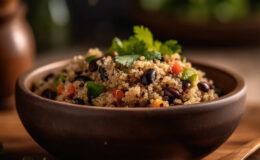Prebiotic foods are high in special types of fiber that support your digestive health. They promote the increase of friendly bacteria in the gut.
Probiotics, also known as the “beneficial bacteria” found in fermented foods and dietary supplements, seems to be all people are talking about these days. One that is equally important are the lesser-known prebiotics, non-digestible fibers that act as fertilizers to help support the growth of beneficial bacteria. Basically, probiotics introduce new bacteria into the system whereas prebiotics feeds the bacteria already in the gut.
The gut bacteria need food to survive and do their job and prebiotics are the perfect way to feed them. Just like us, our gut bacteria need good fuel to thrive, not processed junk, sugars, and refined carbs. When the microbes are fed properly, they promote good gut health by nourishing the gut barrier. Prebiotics may help with immune health, regulating blood sugar levels that are already in a normal range, and contribute to glowing skin and keep our appetite under control.
Prebiotic foods you should eat.
- Chicory Root: Approximately 47% of chicory root fiber comes from the prebiotic fiber inulin. The inulin in chicory root nourishes the gut bacteria, supports healthy digestion and helps promote regularity.
- Dandelion Greens: These contain 4 grams of fiber per 100-gram serving. A high portion of this fiber comes from inulin. Dandelion greens are also known to help support healthy weight management, provide a source of antioxidants, and may help maintain normal cholesterol levels already within a healthy range.
- Jerusalem Artichoke: These provide about 2 grams of dietary fiber per 100 grams, 76% of which comes from inulin. Additionally, they help strengthen the immune system and support healthy metabolism.
- Garlic: About 11% of garlic’s fiber content comes from inulin and 6% from a sweet, naturally occurring prebiotic called fructooligosaccharides (FOS). Garlic acts as a prebiotic by promoting the growth of beneficial Bifidobacteria in the gut to maintain a balanced gut microbiome for good health.
- Onions: Like garlic, inulin accounts for 10% of the total fiber content of onions, while FOS makes up around 6%.
- Asparagus: The inulin content maybe around 2-3 grams per 100-gram (3.5-oz) serving. Asparagus has shown to promote friendly bacteria in the gut.
- Bananas: Bananas contain small amounts of inulin. Unripe (green) bananas are also high in resistant starch, which has prebiotic effects.
- Barley: Barley is a popular cereal grain and is used to make beer. It contains 3-8 grams of beta-glucan per 100-gram serving. Beta Glucan is a prebiotic fiber that promotes the growth of friendly bacteria in the digestive tract.
- Oats: Whole oats are a very healthy grain with prebiotic benefits. They contain large amounts of beta-glucan fiber, as well as some resistant starch. Beta-glucan from oats have been linked to beneficial gut bacteria, and helping to maintain normal cholesterol and blood sugar levels already within a healthy range.
- Apples: Apples are a delicious fruit. Pectin accounts for approximately 50% of an apple’s total fiber content. The pectin in apples has prebiotics benefits. It increases butyrate, a short-chain fatty acid that feeds the beneficial gut bacteria.
Find this article interesting and useful?
Our mission at PushPointe is to motivate, educate, and inspire you to live the fit life. If you don’t already subscribe to the world’s most popular health and fitness site, click here to join thousands in our health conscious community. Have a comment, question, or idea? Email us at info@pushpointe.com.










